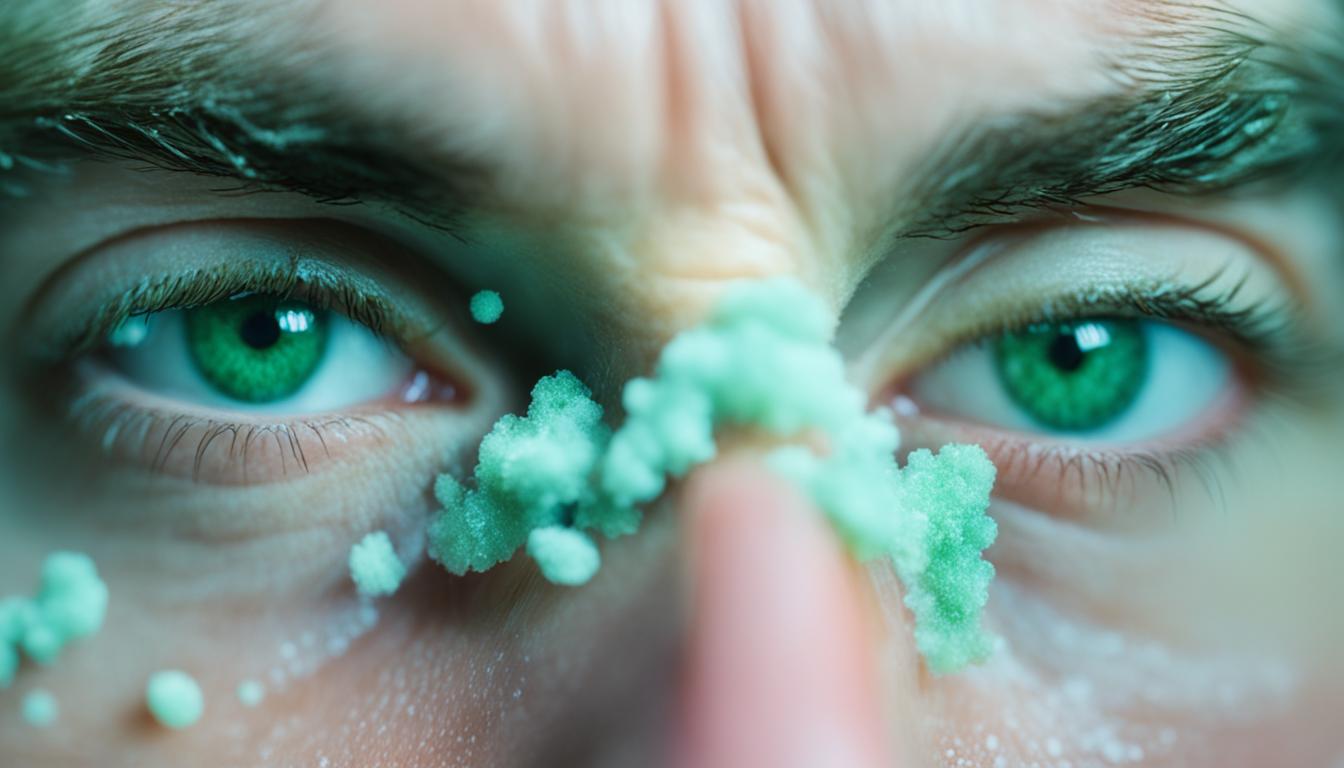
Mold Allergy Symptoms: Recognize the Signs
Are you experiencing persistent coughing, sneezing, or a runny nose? It could be more than just a common cold. Mold allergies, triggered by exposure to mold spores, can cause a variety of symptoms that can impact your daily life. Understanding the signs of a mold allergy is crucial in order to take proactive steps in managing your health and creating a healthier indoor environment.
Key Takeaways:
- Mold allergies can cause symptoms such as coughing, sneezing, and a runny nose.
- Exposure to mold spores can trigger respiratory issues and skin irritation.
- Managing mold allergy symptoms involves identifying and eliminating sources of mold in your environment.
- Seek professional help from experts like Fix Mold Miami for mold assessments and remediation.
- By recognizing and managing mold allergy symptoms, you can improve your overall well-being and indoor air quality.
Common Mold Allergy Symptoms
Mold allergies can cause a range of symptoms that can vary from person to person. In this section, we will explore the most common mold allergy symptoms experienced by individuals. Understanding these symptoms is crucial for better identifying and managing a potential mold allergy.
Respiratory Symptoms
One of the primary areas affected by mold allergies is the respiratory system. Exposure to mold spores can lead to:
- Stuffy or runny nose: Allergies caused by mold can trigger nasal congestion, sneezing, and a constant drippy or congested nose.
- Coughing and wheezing: Mold allergies can cause persistent coughing, wheezing, and difficulty in breathing, especially for individuals with asthma.
- Shortness of breath: Mold exposure can result in tightness and difficulty in breathing, leading to shortness of breath.
Skin Symptoms
Mold allergies can also affect the skin, causing various dermatological symptoms, such as:
- Rashes and hives: Direct contact with mold or inhaling mold spores can lead to rashes, hives, or itchy skin.
- Eczema flare-ups: Individuals with eczema may experience worsening of symptoms, including redness, itching, and irritation, when exposed to mold.
Overall Well-being
In addition to respiratory and skin symptoms, mold allergies can impact overall well-being, leading to:
- Fatigue and headaches: Mold allergies can cause persistent fatigue and frequent headaches.
- Sinus infections: Prolonged exposure to mold can increase the risk of recurring sinus infections, often accompanied by facial pain and pressure.
Recognizing these common mold allergy symptoms is essential for prompt identification and management. If you or a loved one are experiencing any of these symptoms, it may be beneficial to consult with a healthcare professional or allergy specialist for further evaluation and guidance.
Remember, proper identification and management of mold allergies can help improve your health and overall quality of life.

| Mold Allergy Symptoms | Respiratory Symptoms | Skin Symptoms | Overall Symptoms |
|---|---|---|---|
| Stuffy or runny nose | Coughing and wheezing | Rashes and hives | Fatigue and headaches |
| Coughing and wheezing | Shortness of breath | Eczema flare-ups | Sinus infections |
Managing Mold Allergy Symptoms
If you have been diagnosed with a mold allergy, it’s crucial to manage your symptoms effectively to improve your overall quality of life. By taking proactive steps and implementing practical strategies, you can minimize the impact of mold on your health. Here are some tips to help you manage your mold allergy symptoms:
1. Identifying and Eliminating Mold Sources
One of the essential steps in managing mold allergy symptoms is to identify and eliminate mold sources in your home or workplace. Conduct a thorough inspection to identify any areas where mold may be thriving, such as damp basements, bathrooms, or areas with water damage. Once identified, take immediate action to remove the mold and repair any underlying moisture issues.
2. Improving Indoor Air Quality
To reduce your exposure to mold and alleviate your symptoms, it’s crucial to improve indoor air quality. Use air purifiers with HEPA filters to remove airborne mold spores. Keep humidity levels below 50% to prevent mold growth. Regularly clean and vacuum your home, paying special attention to areas prone to moisture or mold accumulation.
3. Seeking Professional Assistance
If you’re unsure about the presence of mold or are struggling to manage your symptoms, consider seeking professional assistance. Mold remediation experts can conduct thorough inspections, identify hidden mold sources, and provide effective solutions for mold removal and prevention. Their expertise can help you create a healthier living environment.
4. Allergy Medications and Treatments
There are various over-the-counter allergy medications available that can help alleviate mold allergy symptoms. These include antihistamines, nasal corticosteroids, and decongestants. However, it’s important to consult with your healthcare provider before starting any medication to ensure it is suitable for your specific needs.
In severe cases, your doctor may recommend immunotherapy (allergy shots) to help desensitize your body to mold allergens. This treatment can provide long-term relief from mold allergy symptoms by gradually reducing your immune system’s response to mold exposure.
5. Lifestyle Changes
Implementing certain lifestyle changes can also help manage your mold allergy symptoms effectively. Avoid spending extended periods of time in environments with high mold levels, such as damp and musty areas. Use dust-proof covers for mattresses and pillows to limit exposure to mold spores while sleeping. Additionally, regularly wash bedding, curtains, and other items that may harbor mold.

By following these tips and strategies, you can effectively manage your mold allergy symptoms and improve your overall well-being. Remember, early identification and proactive measures are key to minimizing the impact of mold on your health. Take control of your environment and prioritize your health.
Conclusion
In conclusion, recognizing and managing mold allergy symptoms is crucial for maintaining good health and improving indoor air quality. By understanding the signs and symptoms of mold allergies, individuals can take proactive steps to mitigate their effects and create a healthier living environment.
At Fix Mold Miami, we are committed to helping our clients address their mold-related concerns. As trusted experts in mold assessments, prevention, and remediation, our team is equipped with the knowledge and resources to identify and eliminate mold sources effectively.
If you suspect mold allergies or need professional assistance with mold-related issues, don’t hesitate to contact Fix Mold Miami at 305-465-6653. Our experienced professionals will provide a comprehensive mold assessment and guide you through tailored solutions to improve your indoor air quality. Take control of your health and the air you breathe with Fix Mold Miami.




